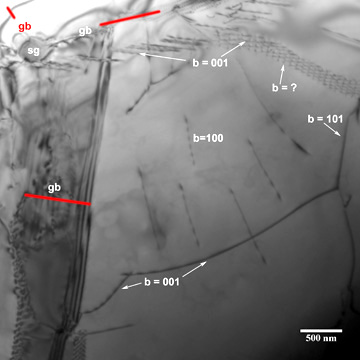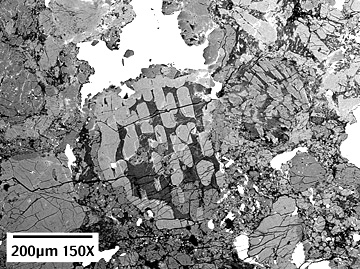 . .
Bright-field transmission electron microscope
image of dislocations in an olivine grain in the MIL 99301 chondrite. Red
lines (and gb) indicate grain boundaries. A subgrain boundary can
be seen in the upper right (where b = ?).

Back-scattered electron image of fragmented
chondrules in the Buzzard Coulee chondrite. Opaque minerals are white,
olivine is light gray, pyroxene is dark gray, and feldspar is very dark
gray to black.
|
Research
about processes occurring in the early solar system:
-
Deformation and thermal histories
of chondritic meteorites based on olivine microstructures-- examining
the shock and annealing in chondrites with the aid of transmission electron
microscopy [Hutson
et al. (2007b), Hutson
et al. (2009a)]
-
Aggregational olivine inclusions
in chondrites-- how early-formed dust evolved in the solar system
and how it relates to other primitive material (chondrules and CAIs) [Ruzicka
et al. (2008)]
-
Relict olivine grains in chondrules--
the chemical, isotopic, physical and thermal processing of chondrules as
revealed by incompletely melted olivine grains in chondrules [Ruzicka
et al. (2007), Ruzicka
et al. (2008)]
-
Partly shock-melted chondritic
meteorites-- examining the effects of shock on the textures and
chemistry of chondritic meteorites and their components [Hutson
et al. (2007a)]
Research regarding the classification
of meteorites:
|


 .
.
